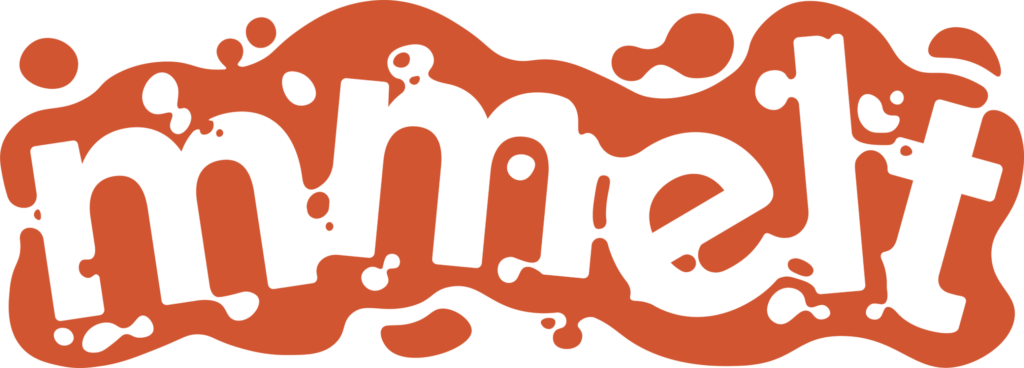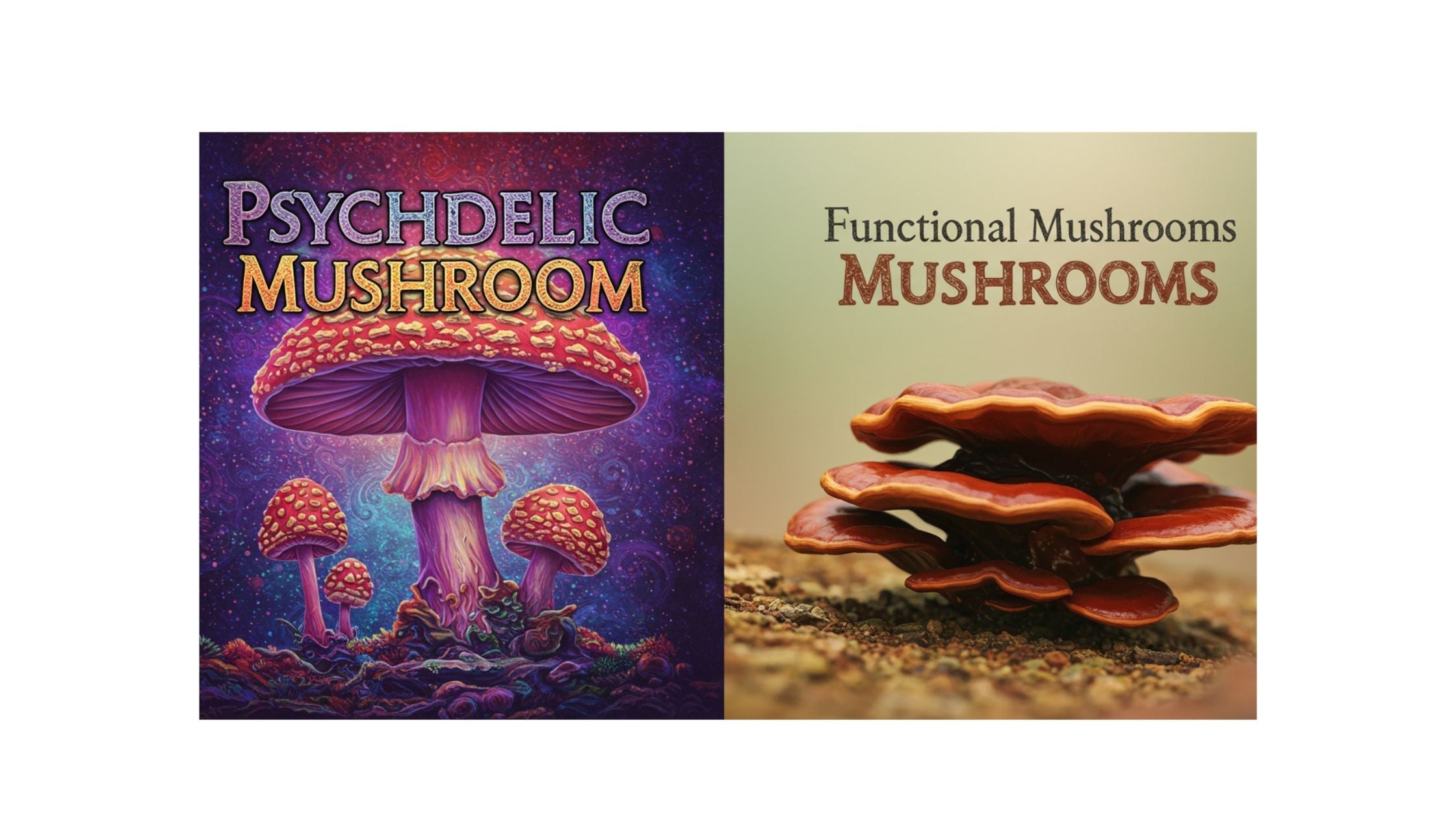Discover the key difference between Psychedelic Mushroom and Functional Mushrooms, exploring their unique properties and uses.

Today, psilocybin is often consumed not only in its raw form but also in modern products such as mushroom chocolates and mushroom gummies, which provide a more palatable and discreet way of ingestion. However, despite their growing popularity, these substances remain controlled in most regions due to their powerful mind-altering effects.
Functional mushrooms, on the other hand, are non-psychoactive varieties like reishi, lion’s mane, and chaga. They are consumed for their adaptogenic and medicinal properties, supporting immunity, focus, and overall wellness. These mushrooms are widely available as powders, capsules, and teas.
What are Psychedelic Mushrooms?
Psychedelic mushrooms, often referred to as magic mushrooms, are naturally occurring fungi that contain psychoactive compounds such as psilocybin and psilocin. These substances influence brain chemistry, leading to altered perception, mood shifts, and profound cognitive experiences.
-
Contain psilocybin, which converts to psilocin in the body and affects serotonin receptors.
-
Induce altered states of consciousness, including visual and auditory distortions.
-
Known for creating a sense of interconnectedness and spiritual insight.
-
Effects vary widely depending on dosage, mindset, and environment (“set and setting”).
-
Experiences can range from euphoria and creativity to anxiety and confusion.
-
Have been used in indigenous rituals for thousands of years for healing and spirituality.
-
Peak effects typically last 4–6 hours, with aftereffects sometimes lingering.
-
Can temporarily disrupt the brain’s default mode network, altering thought patterns.
-
May enhance introspection and emotional processing during the experience.
-
Tolerance develops quickly, requiring days of rest before re-experiencing full effects.
-
Physical addiction is not common, but psychological reliance is possible.
-
Overconsumption can lead to overwhelming or “bad trips” with intense fear or paranoia.
-
Legal status remains highly restricted in most countries due to their psychoactive nature.
-
Clinical research is exploring potential benefits for depression, PTSD, and anxiety.
-
Risk factors include triggering latent mental health conditions in vulnerable individuals.
Defining Functional Mushrooms: Nutrition and Wellness Role
Functional mushrooms are a category of fungi valued for their non-psychoactive health-supporting properties. Unlike psychedelic varieties, they do not alter perception but instead provide nutritional and adaptogenic benefits. They are widely used in modern wellness routines and traditional medicine alike.
These mushrooms are rich in bioactive compounds such as polysaccharides, beta-glucans, and antioxidants. Such compounds help support immune defense, reduce oxidative stress, and promote overall vitality. Their natural composition makes them a popular choice for daily dietary supplementation.

Common functional mushrooms include reishi, lion’s mane, chaga, cordyceps, and turkey tail. Each variety offers unique advantages, from cognitive support to stress management and energy enhancement. This diversity allows individuals to choose mushrooms that best match their wellness goals.
Today, functional mushrooms are consumed in various convenient forms such as powders, teas, tinctures, and capsules. Their versatility makes them easy to integrate into everyday diets, whether through drinks, supplements, or cooking. This accessibility has fueled their growing popularity in the health and wellness industry.
Functional Mushrooms vs Psychedelic Mushrooms in Everyday Diet: Nutrition and Adaptogens
Functional mushrooms have gained popularity as natural supplements that go beyond basic nutrition. They are valued not only for their vitamins and minerals but also for their adaptogenic properties, which help the body manage stress and support overall wellness. Adding them to your diet can be an easy way to balance nutrition with holistic health benefits.
Comparison Table
|
Mushroom Type |
Nutritional Value |
Adaptogenic Benefits |
|
Reishi |
Contains polysaccharides, fiber, and antioxidants |
Supports stress relief, sleep, and immune balance |
|
Lion’s Mane |
Rich in protein, amino acids, and B-vitamins |
Enhances cognitive function, memory, and focus |
|
Chaga |
High in fiber, vitamin D, and minerals like zinc |
Powerful antioxidant, reduces inflammation, boosts resilience |
|
Cordyceps |
Provides energy-supporting compounds and amino acids |
Increases stamina, oxygen utilization, and stress tolerance |
|
Turkey Tail |
Contains prebiotic fibers, beta-glucans, and vitamin K |
Strengthens immunity, supports gut health, improves resilience |
Health Benefits of Functional Mushrooms for Wellness and Immunity
Functional mushrooms have been valued for centuries in traditional medicine for their powerful health-promoting properties. Unlike psychedelic varieties, functional mushrooms focus on supporting the body’s natural balance and resilience. They are rich in bioactive compounds that strengthen immunity, enhance energy, and promote overall wellness.
-
Boost immune system function with natural beta-glucans.
-
Support the body’s stress response through adaptogenic properties.
-
Enhance energy and reduce fatigue without stimulants.
-
Promote gut health with prebiotic polysaccharides.
-
Improve mental clarity, focus, and memory.
-
Aid in balancing hormones and regulating mood.
-
Provide antioxidant protection against free radicals.
-
Support heart health and healthy cholesterol levels.
-
Enhance physical endurance and recovery.
-
Promote restful sleep and relaxation.
-
Strengthen respiratory health and lung function.Aid liver detoxification and overall organ health.
-
Contribute to healthy skin, hair, and nails.
-
Support anti-inflammatory processes in the body.
-
Encourage longevity and healthy aging through cellular support.
Psychedelic Mushrooms in Texas: Laws and Availability
Psychedelic mushrooms in Texas remain a controversial subject, primarily due to strict state laws surrounding their possession and use. While interest in their therapeutic potential is growing, access and availability are highly restricted. Understanding the legal framework and current situation is essential before considering them in any context.
-
Psychedelic mushrooms, often called “magic mushrooms,” contain the psychoactive compound psilocybin.
-
In Texas, psilocybin is classified as a controlled substance under state law.
-
Possession of psychedelic mushrooms can result in severe legal consequences, including felony charges.
-
Texas law treats cultivation, distribution, and sale of psilocybin mushrooms as criminal offenses.
-
Unlike cannabis, there is no broad decriminalization movement for psychedelic mushrooms in Texas.
-
Availability is limited to underground markets, which pose risks of legality and product safety.

-
Texas has not legalized psychedelic mushrooms for recreational or medical use.
-
Clinical research into psilocybin is ongoing nationwide but does not alter Texas state law.
-
Some Texans travel to other states or countries where psilocybin has been decriminalized or studied legally.
-
There is growing public interest in the therapeutic potential of psychedelic mushrooms.
-
Discussions about psychedelic-assisted therapy are increasing, but remain outside Texas law.
-
Functional Mushrooms, such as reishi and lion’s mane, are legal and often confused with psychedelic mushrooms.
-
Penalties for possession vary depending on the quantity of mushrooms found.
-
Advocacy groups are working toward potential reform, though no immediate changes have been implemented.
-
Education is crucial to distinguish between legal functional mushrooms and illegal psychedelic mushrooms in Texas
Are Functional Mushrooms Legal in the United States?
Functional mushrooms have gained popularity in the wellness industry for their adaptogenic and health-supporting properties. Many people wonder about their legal status, especially as interest in mushrooms grows alongside discussions about psychedelics. In the United States, functional mushrooms fall into a different category than psychedelic varieties.
Legal Status of Functional Mushrooms
Functional mushrooms such as reishi, lion’s mane, chaga, and cordyceps are considered legal dietary supplements in the United States. They are commonly sold in powder, capsule, tea, and tincture form. Unlike psychedelic mushrooms, these varieties do not contain psychoactive compounds.
FDA and Regulation of Functional Mushrooms
Although functional mushrooms are legal, they are not FDA-approved as medicines. Instead, they are regulated under dietary supplement guidelines, which means companies cannot make medical claims about curing diseases. Still, their safety and availability make them widely accessible.
Market Availability of Functional Mushrooms
Functional mushrooms are easily found in health food stores, online shops, and even in mainstream grocery retailers. Their inclusion in coffees, snacks, and wellness products reflects their acceptance as part of a healthy lifestyle. This wide availability reinforces their legal and mainstream status.
Can Psychedelic Mushrooms Go Bad and How to Store Them Safely?
Like any organic substance, psychedelic mushrooms have a shelf life and can degrade if not stored properly. Improper handling may lead to loss of potency, changes in texture, or even contamination. Understanding how to store them safely helps preserve their quality and reduces health risks.
-
Fresh psychedelic mushrooms can spoil within days if left at room temperature.
-
Signs of spoilage include slimy texture, dark spots, or foul odor.
-
Drying mushrooms significantly extends their shelf life by removing moisture.
-
Airtight containers prevent exposure to oxygen and reduce degradation.
-
Glass jars are preferred over plastic, as they resist moisture and odor transfer.
-
Desiccants like silica gel packs can help maintain dryness inside containers.
-
Light exposure can weaken potency; store mushrooms in a dark place.
-
Heat accelerates breakdown of active compounds; keep them in a cool environment.

-
Refrigeration may slow spoilage of fresh mushrooms but is not ideal for long-term storage.
-
Freezing dried mushrooms is an effective way to keep them potent for months or years.
-
Avoid handling with wet hands, as moisture can encourage mold growth.
-
Vacuum sealing is a popular method for keeping air and moisture out.
-
Always inspect mushrooms before use, even if stored correctly.
-
Proper labeling with date of storage helps track freshness over time.
-
Safe storage not only preserves potency but also minimizes health risks from contamination.
User Experience: Psychedelic Mushrooms vs. Functional Mushrooms
The experience of consuming psychedelic mushrooms is often intense, unpredictable, and deeply influenced by mindset and environment. In contrast, functional mushrooms deliver steady, reliable benefits that integrate smoothly into daily routines without altering perception.
-
Psychedelic mushrooms may induce vivid visual and auditory hallucinations.
-
Experiences can vary greatly, even with the same dose.
-
Emotional responses range from euphoria to anxiety or fear.
-
Set (mindset) and setting (environment) strongly shape the outcome.
-
Trips often last several hours, with lingering aftereffects.
-
Some users report profound spiritual or transformative insights.
-
Others may face disorientation, confusion, or psychological discomfort.
-
Functional mushrooms provide consistent, non-psychoactive results.
-
Benefits like improved focus, energy, and calmness are gradual and steady.
-
They can be incorporated daily without disrupting normal activities.
-
Functional mushrooms support resilience rather than altering consciousness.
-
Side effects are typically mild, such as digestive sensitivity in some people.
-
Psychedelics carry legal and social risks; functional mushrooms do not.
-
Many people use functional mushrooms as part of long-term wellness routines.
-
Overall, psychedelics expand consciousness unpredictably, while functional mushrooms nurture the body and mind reliably.
Are Psychedelic Mushrooms Addictive or Habit-Forming?
Psychedelic mushrooms are often discussed in relation to their mind-altering effects, but many people wonder if they can lead to addiction or dependency. Unlike substances that cause physical cravings, psychedelic mushrooms interact differently with the brain. Understanding their effects helps clarify the risks, limitations, and misconceptions around their use.
-
Psychedelic mushrooms primarily affect serotonin receptors in the brain.
-
They do not create the same type of chemical dependency as alcohol or opioids.
-
Tolerance builds quickly with repeated use, reducing their immediate appeal.
-
Users generally need several days between doses to feel similar effects again.
-
They are not considered physically addictive.
-
Cravings for use are rare compared to habit-forming substances.
-
Psychological dependence can occur in some individuals.
-
Set and setting strongly influence the experience and its impact.
-
Some people misuse them as a form of escapism, leading to unhealthy patterns.
-
They may trigger or worsen underlying mental health issues in vulnerable users.
-
No withdrawal symptoms like those from stimulants or depressants are typical.
-
Their powerful experiences often discourage frequent, casual use.
-
Responsible, informed use reduces the risk of harmful patterns.
-
Scientific research classifies them as low in addictive potential.
-
Misconceptions about them being highly addictive stem from stigma, not science.
Exploring the Cultural and Medical Use of Psychedelic Mushroom Worldwide
Psychedelic mushrooms have been part of human history for thousands of years, valued for their spiritual, cultural, and healing significance. From indigenous ceremonies to modern clinical research, their use reflects both tradition and innovation. Today, psychedelic mushrooms are studied globally for their potential therapeutic benefits and cultural importance.
-
Ancient civilizations, such as the Aztecs and Mayans, used psychedelic mushrooms in religious rituals.
-
Indigenous tribes in Mexico referred to them as “teonanácatl,” meaning “flesh of the gods.”
-
Psychedelic mushrooms have been used to induce visions and connect with spiritual realms.
-
Shamans in Central and South America incorporated them into healing ceremonies.
-
In some cultures, mushrooms symbolize rebirth, transformation, and spiritual awakening.
-
Western awareness of psychedelic mushrooms grew during the mid-20th century.
-
In the 1960s, psychedelic mushrooms became central to countercultural movements.
-
Modern neuroscience has begun exploring their potential in mental health treatment.
-
Studies suggest possible benefits for depression, anxiety, and PTSD.
-
Psilocybin, the active compound, is being tested in clinical trials worldwide.
-
Countries like Brazil and Jamaica allow or tolerate psychedelic mushroom use in some contexts.
-
Decriminalization movements have emerged in parts of the United States and Europe.
-
Cultural festivals still celebrate mushrooms as sacred and mystical symbols.
-
Ethical debates continue around traditional use versus modern commercialization.
-
Global perspectives reveal a blend of ancient reverence and cutting-edge science.
Legality Contrast: Psychedelic Mushrooms vs. Functional Mushrooms
The legal status of mushrooms highlights a sharp divide between psychedelic and functional varieties. Psychedelics, due to their psychoactive compound psilocybin, remain highly restricted in most regions and are often treated as controlled substances.
-
Psychedelic mushrooms are classified as controlled substances in most countries.
-
Possession, cultivation, or distribution of psychedelics can result in severe criminal penalties.
-
Functional mushrooms like reishi, chaga, and lion’s mane are fully legal as dietary supplements.
-
Psychedelics are tied to strict federal laws in the U.S., with state-level exceptions only emerging recently.
-
Functional mushrooms are sold in mainstream grocery stores, online platforms, and wellness shops.
-
Legal risks with psychedelics include fines, imprisonment, and long-term criminal records.

-
Functional mushrooms face no such restrictions and are encouraged in holistic health practices.
-
Psychedelics are under clinical trials but remain illegal outside approved research programs.
-
Functional mushrooms are regulated under dietary supplement guidelines, not drug laws.
-
Psychedelics cannot be advertised or sold openly in most jurisdictions.
-
Functional mushrooms are freely marketed and promoted for immune, cognitive, and energy support.
-
Psychedelic legalization is limited to specific localities (e.g., certain U.S. cities and countries).
-
Functional mushrooms enjoy global acceptance with minimal legal barriers.
-
Psychedelics often require underground or unsafe markets for access.
-
Functional mushrooms represent an everyday wellness option with no legal or cultural stigma.
Conclusion
Psychedelic mushrooms and functional mushrooms represent two distinct yet fascinating aspects of the fungal world. While psychedelic mushrooms are primarily associated with altered states of consciousness and spiritual exploration, functional mushrooms focus on supporting health, immunity, and overall balance.
The cultural history of psychedelic mushrooms shows their deep roots in human tradition, from ancient rituals to modern clinical research. Their role continues to evolve as science explores therapeutic potential, even while strict regulations limit access in many regions. This duality highlights the tension between heritage, legality, and innovation.
In recent years, this evolution has also given rise to new forms of consumption, such as What are mushroom gummies?—edible products that infuse mushroom extracts into a convenient, flavored format.

Functional mushrooms, in contrast, have seamlessly integrated into modern wellness practices. Their adaptogenic and nutritional benefits make them accessible, safe, and legal options for everyday health. With growing popularity in supplements, teas, and foods, they embody the link between natural remedies and holistic living.
Ultimately, both psychedelic and functional mushrooms carry value—one in expanding the mind, the other in nourishing the body. Recognizing their unique purposes ensures respect for cultural traditions, scientific research, and individual wellbeing. In Utah, where functional mushroom wellness practices are gaining visibility, local contexts highlight how tradition and innovation intersect, paving the way for thoughtful use worldwide.
FAQs
Can functional mushrooms be taken daily?
Yes, functional mushrooms like reishi, lion’s mane, and cordyceps are safe for daily use and are often consumed as powders, teas, or capsules to support long-term wellness.
Do psychedelic mushrooms grow naturally in the wild?
Yes, psychedelic mushrooms grow in various climates around the world, especially in humid regions, but proper identification is crucial to avoid toxic look-alikes.
Can functional mushrooms be cooked into meals?
Absolutely, functional mushrooms can be added to soups, broths, and stir-fries without losing their beneficial properties, making them easy to integrate into diets.
Are there side effects of consuming functional mushrooms?
Most people tolerate functional mushrooms well, but some may experience mild digestive upset or allergies, so starting with small amounts is recommended.
How are psychedelic mushrooms typically consumed?
They are usually ingested fresh, dried, or brewed into teas, though preparation methods vary across cultures and personal practices.
Can functional mushrooms support athletes?
Yes, varieties like cordyceps are popular among athletes for their ability to boost stamina, oxygen use, and post-exercise recovery.
Do psychedelic mushrooms have cultural symbolism?
Yes, many cultures see them as sacred tools for spiritual awakening, transformation, and connecting with higher consciousness.
Are functional mushrooms suitable for children?
Functional mushrooms are generally intended for adults, and parents should consult a healthcare professional before giving them to children.



Share:
Mushroom Gummies vs Mushroom Shots: Which Works Best?
How Long Does Magic Mushroom Chocolate Take to Kick In?